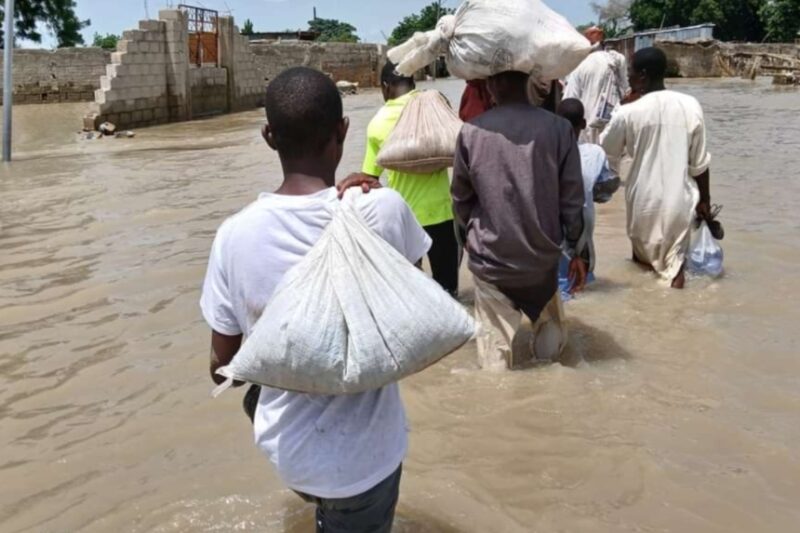Displaced persons in unofficial camps have not received any relief aid from the government even though they lost all their possessions in the flood and are struggling to survive.
Displaced persons who lost all their possessions – including their tents and shelters – in the devasting September 10 flood that engulfed Maiduguri and surrounding areas say they have not received any relief aid from the government.
Residents – who fled from the Fariya Garkin Block IDP camp in the metropolis to escape being swept away in the raging floodwater – want to know why the Borno State government has excluded them and have accused authorities of ignoring them.
More than half of Maiduguri, the capital of Borno State, and its environs were submerged in the flood, which began in the early hours of Tuesday, September 10, when the Alau Dam collapsed.
About two million people were affected by the flood and more than 400,000 were displaced. Critical infrastructure – including roads, bridges, schools, markets, businesses and hospitals – were washed away. Thousands of homes were submerged and destroyed.
It took weeks for the water to subside.
Money poured in from the federal government, other states in Nigeria, international humanitarian agencies and wealthy individuals to help the victims.
Babagana Umara Zulum, the governor of Borno State, put together a flood relief distribution committee to assess the damage and hand out much-needed relief materials – including food and cash – to victims who lost everything in the flood.
But not all flood victims have received assistance. And many are complaining that they are being ignored or have been excluded. They say they have not seen anyone from the flood relief distribution committee.
They have no shelters, food or clean drinking water. They have no toilet facilities. Women and children are sick with malaria and other illnesses.
Umar Abubakar, who is originally from the Marte Local Government Area, was staying in the Fariya Garkin Block IDP camp in Maiduguri when the flood overwhelmed the city and surrounding areas.
“It was terrifying. We had to leave our tents and shelters in the camp when the water started rising. It all started in the early hours of the morning. We had to leave Fariya Block in a hurry because the water was rising fast.
“We managed to pick up a few bits and pieces but most of us left with nothing. We knew we had to get out of the camp as quickly as possible so that we would not get swept away in the floodwater.
“When we tried to go back to the camp, we saw the flood had destroyed our tents and shelters. The wall surrounding the camp collapsed. Fariya Block was inaccessible.
“I – with many others from the camp – went to Gubio camp, a temporary shelter for persons displaced in the flood.
“Now we’re back in Fariya but we have nothing. You can see. There are no proper toilet facilities. There is not a tap where we can fetch water. There is not even a dam close by.
“Our children have been falling ill and there’s no proper health facility.
“We have nothing and no one from the government – or even humanitarian agencies – has come to talk to us to find how the flood affected us. No one has come to assess the damage. We have received no help at all. There is lots of talk about interventions to help flood victims but we have not received any assistance.
“We are humbly requesting the government to please come to our aid because we are really struggling.”
Bukar Aisamim, who stays in Fariya Buzu camp in Maiduguri, said: “We were able to survive the flood only by the grace of God. We went to Gubio camp for temporary shelter. We stayed there for more than 10 days before the authorities told us to leave.
“The government told the committee to make a list of the people most affected by the flood. But then we heard that people in unofficial camps were not included.
“We are desperate for relief aid. We have nothing to eat and no clean water. Most people are ill with malaria – there are mosquitoes everywhere. It is difficult to sleep because of the hunger and the mosquitoes. Every day more people are falling ill, especially young children and women. We cannot afford insecticide-treated nets.”
Ali Bolori, special adviser to Zulum, said: “We are going house to house to capture individuals’ data and submit it to the government so that we can help those who need it most. That is our main priority.
“It is true that up until now we have not given relief materials to those who are living in unofficial IDP camps in host communities because it has still not been approved and we have not been given the go ahead to distribute aid.
“One of the problems is that without the correct data, people who are not entitled to receive relief materials will take advantage. They will go as far as building other camps and will expect to receive regular assistance.
“The distribution of relief materials is still ongoing for people is areas that were most affected. If anyone has not received aid, they should ask the head of their ward to write to the monitoring and evaluation office. The matter will be investigated.”
AYSHA MUSTAPHA KOLOMI








